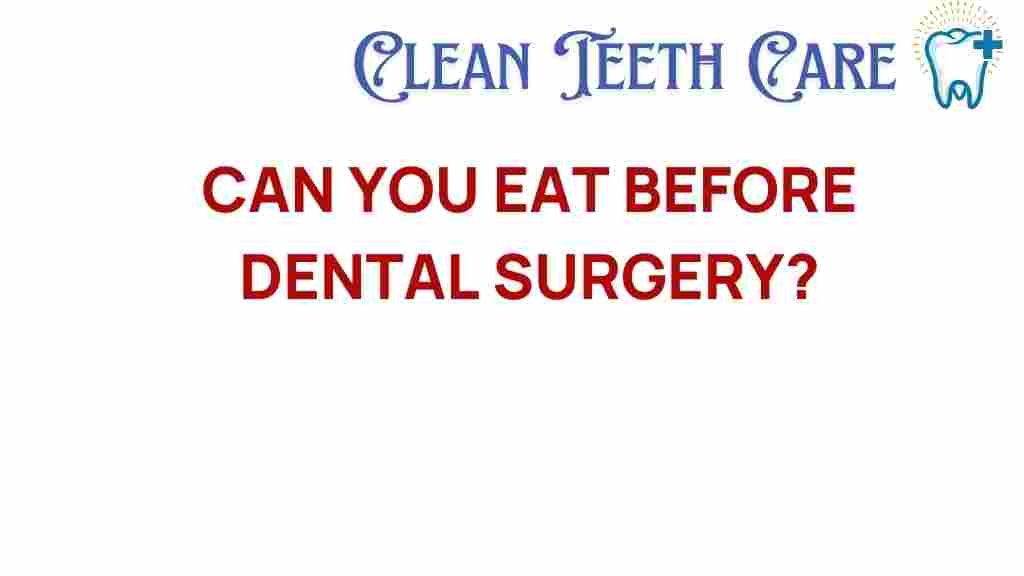The Surprising Truth: Can You Eat Before Dental Surgery?
Dental surgery is often a necessary procedure for maintaining optimal dental health. Whether it’s a tooth extraction, dental implant, or gum surgery, understanding what to do before your operation is crucial. One common question that arises is, “Can you eat before dental surgery?” The answer isn’t straightforward, as it depends on various factors, including the type of surgery, the anesthesia used, and your individual health circumstances. In this article, we will delve into the pre-surgery guidelines regarding eating before surgery, offer valuable patient advice, and discuss how proper nutrition can aid in recovery.
Understanding Dental Surgery and Anesthesia
Before we explore the guidelines on eating before surgery, it’s essential to understand the context of dental surgery and the role of anesthesia. Dental surgeries can involve various procedures, from minor to major interventions. Anesthesia can be local, sedation, or general, and each type has specific requirements regarding food intake.
- Local Anesthesia: Often used for minor procedures, local anesthesia numbs only the area being treated. Generally, eating before the surgery is allowed, but follow your dentist’s recommendations.
- Sedation: For more extensive work, sedation may be employed. Patients are usually advised to refrain from eating for a certain period before the procedure.
- General Anesthesia: This is used for major surgeries, requiring patients to fast for a specific duration—typically 6 to 8 hours before the operation.
Understanding these distinctions helps clarify when you can eat, ensuring you follow the appropriate pre-surgery guidelines.
Pre-Surgery Guidelines for Eating
When it comes to dental surgery, adhering to your dentist’s pre-surgery instructions is paramount. Here are some general guidelines:
- Consult Your Dentist: Always follow the specific advice given by your dentist or oral surgeon. They will provide the best recommendations based on your unique situation.
- Know Your Anesthesia: As mentioned, different anesthesia types require different fasting times. Be aware of what will be used for your surgery.
- Timing Matters: If advised to fast, understand the timeframe. For general anesthesia, this usually means no solid food for at least 6 to 8 hours prior.
- Hydration is Key: Staying hydrated is essential. However, if fasting is required, your dentist will also specify if you can drink water, and when you should stop.
Nutrition and Dental Health
Proper nutrition plays a vital role in your overall dental health and can significantly impact your recovery after surgery. Consuming a balanced diet rich in vitamins and minerals is crucial before and after your dental surgery.
- Vitamin C: Essential for healing, it helps with tissue repair. Include fruits like oranges and strawberries in your diet.
- Protein: Important for recovery, consider lean meats, beans, and nuts.
- Calcium and Vitamin D: These nutrients support bone health, particularly important if undergoing procedures like implants. Dairy products and leafy greens are excellent sources.
Eating well before your surgery can help strengthen your immune system, making you better equipped for recovery.
What to Eat After Dental Surgery
Once your dental surgery is complete, your focus will shift to recovery. Here are some recommendations for what to eat post-surgery:
- Soft Foods: Foods such as yogurt, applesauce, mashed potatoes, and smoothies are gentle on your healing mouth.
- Cold Foods: Ice cream and chilled soups can help soothe inflammation.
- Stay Hydrated: Drink plenty of fluids, but avoid straws as they can dislodge blood clots.
It’s crucial to avoid foods that are hard, crunchy, or spicy for a few days following surgery, as they can irritate your healing tissues.
Troubleshooting Tips for Eating Before Surgery
Here are some tips to help you navigate any uncertainties about eating before surgery:
- Clarify Any Doubts: If you’re unsure about whether you can eat or drink anything, don’t hesitate to reach out to your dental office.
- Plan Ahead: If fasting is required, plan your last meal accordingly, ensuring it’s nutritious and satisfying.
- Follow-Up Care: After the procedure, if you experience difficulties eating or any other complications, contact your dentist for advice.
Conclusion
In conclusion, the question of whether you can eat before dental surgery is highly dependent on the type of anesthesia used and your specific situation. Always follow the pre-surgery guidelines provided by your dental professional. Proper nutrition before and after your surgery is vital for your dental health and recovery. By understanding the importance of nutrition and adhering to the necessary patient advice, you can ensure a smoother surgical experience and quicker recovery.
If you have further questions or need more detailed information, consider checking out resources like the American Dental Association for more insights on dental health and care.
To improve your overall oral care, visit our Dental Care Tips page for more information!
This article is in the category Treatments and created by CleanTeethCare Team
